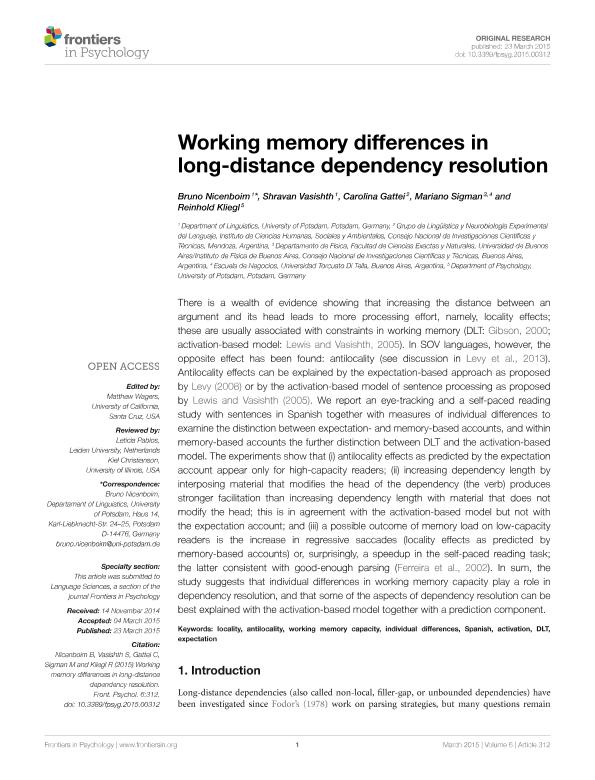Artículo
Working memory differences in long-distance dependency resolution
Fecha de publicación:
03/2015
Editorial:
Frontiers Research Foundation
Revista:
Frontiers in Psychology
e-ISSN:
1664-1078
Idioma:
Inglés
Tipo de recurso:
Artículo publicado
Clasificación temática:
Resumen
There is a wealth of evidence showing that increasing the distance between an argument and its head leads to more processing effort, namely, locality effects; these are usually associated with constraints in working memory (DLT: Gibson, 2000; activation-based model: Lewis and Vasishth, 2005). In SOV languages, however, the opposite effect has been found: antilocality (see discussion in Levy et al., 2013). Antilocality effects can be explained by the expectation-based approach as proposed by Levy (2008) or by the activation-based model of sentence processing as proposed by Lewis and Vasishth (2005). We report an eye-tracking and a self-paced reading study with sentences in Spanish together with measures of individual differences to examine the distinction between expectation- and memory-based accounts, and within memory-based accounts the further distinction between DLT and the activation-based model. The experiments show that (i) antilocality effects as predicted by the expectation account appear only for high-capacity readers; (ii) increasing dependency length by interposing material that modifies the head of the dependency (the verb) produces stronger facilitation than increasing dependency length with material that does not modify the head; this is in agreement with the activation-based model but not with the expectation account; and (iii) a possible outcome of memory load on low-capacity readers is the increase in regressive saccades (locality effects as predicted by memory-based accounts) or, surprisingly, a speedup in the self-paced reading task; the latter consistent with good-enough parsing (Ferreira et al., 2002). In sum, the study suggests that individual differences in working memory capacity play a role in dependency resolution, and that some of the aspects of dependency resolution can be best explained with the activation-based model together with a prediction component.
Archivos asociados
Licencia
Identificadores
Colecciones
Articulos(IFIBA)
Articulos de INST.DE FISICA DE BUENOS AIRES
Articulos de INST.DE FISICA DE BUENOS AIRES
Citación
Nicenboim, Bruno; Shravan, Vasishth; Gattei, Carolina Andrea; Sigman, Mariano; Reinhold, Kliegl; Working memory differences in long-distance dependency resolution; Frontiers Research Foundation; Frontiers in Psychology; 6; 312; 3-2015; 1-16
Compartir
Altmétricas




